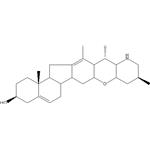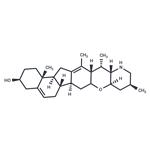Cyclopamine
cyclopamine is a isosteroidal alkaloid isolated from Veratrum plant , it mainly exists in four kinds of liliaceous plants which include North America Veratrum californicum , Indian Cornlily and Veratrum grandiflorum , Fritillaria pallidiflora Schrenk ,it can be combined with the Smoothened (Smo) protein in Hedgehog signaling pathway , thereby inhibiting the protein activity. It was discovered in the 1960s because of its teratogenic effects , but later nineties studies show that cyclopamine is a hedgehog signaling pathway inhibitor, it has been demonstrated in Drosophila body, since the hedgehog signaling pathway mutations are associated with the pathogenesis of a variety of tumors , recent studies have found that cyclopamine have anti-tumor effects in the adult, which has been confirmed in experiments in vivo or in vitro about pancreatic cancer, bile duct cancer, ovarian cancer, liver cancer and others , but on its researches about gastric cancer cells,it has not been reported in the country . Currently cyclopamine as a potential anti-cancer drug in the world sets off a wave of research.
The above information is edited by the chemicalbook of Tian Ye.
Description
Cyclopamine is a natural steroidal alkaloid that inhibits signaling through the hedgehog pathway at the level of the pathway activator Smoothened. By altering gene expression in this signaling sequence, cyclopamine induces defects in morphogenesis, first observed in chicks and sheep as cyclopia. As a readout of action, cyclopamine inhibits hedgehog-
dependent expression of Pax7 with an IC
50 value of 24 nM. Although teratogenic during development, cyclopamine has potential applications in the treatment of cancer.
Chemical Properties
White Crystalline Solid
Uses
Cyclopamine antibacterial properties. Cyclopamine demonstrates teratogenic properties and has been shown to reverse effects of oncogenic mutations in Smoothened and Patched.
Uses
Cyclopamine, is used as a hedgehog [Hh] signaling pathway and Smo inhibitor. It depletes stem-like cancer cells in glioblastoma and blocks tumor engraftment. Can also be used to induce differentiation of human embryonic stem cells (hESCs) into hormone-expressing endocrine cells.
Uses
Has antibacterial properties. Cyclopamine demonstrates teratogenic properties and has been shown to reverse effects of oncogenic mutations in Smoothened and Patched.1
Solubility: 1mg dissolves in 0.2ml DMSO with heating to approximately 70 degrees (ca. 12 mmol sol.)
Solubility: 4mg dissolves in 1ml 95% Ethanol
Definition
ChEBI: Cyclopamine is a member of piperidines. It has a role as a glioma-associated oncogene inhibitor.
Biological Activity
Inhibitor of hedgehog (Hh) signaling, likely via direct inhibition of Smoothened, the accessory protein to the putative Hh receptor Patched. Anti-cancer and teratogenic in vivo . Depletes stem-like cancer cells in glioblastoma and blocks tumor engraftment.
Anticancer Research
Cyclopamine is a natural compound that inhibits the Hedgehog signaling pathway.Cyclopamine targets Hedgehog by specifically hindering SMO activation.Cyclopamine therapy of murine medulloblastoma resulted in the inhibition ofproliferation, induction of neuronal differentiation, effective depletion of CSCs, andreduction of tumor burden in a mouse tumor allograft. Cyclopamine is effective inkilling of pancreatic, breast, and multiple myeloma CSCs. Cyclopamine incombination with gemcitabine inhibits metastatic spread and reduces primary tumorburden in pancreatic orthotopic xenografts. Mammosphere formation in breastcarcinoma and SC proliferation in multiple myeloma can be reduced by cyclopamine(Kawasaki et al. 2008). The HH ligand activation requires cholesterol at theircarboxyl ends, and 22-OH-cholesterol and 20-OH-cholesterol are reported toincrease the HH target gene expression, and this hypothesis of cholesterol-dependentHH signal transduction is investigated in M2-10B4 pluripotent mesenchymal stemcells. The mechanism underlying the positive regulation of HH signaling by theseoxidative species of cholesterol is not clear. However, this oxidative status ofcholesterol is altered by the endogenous ROS. Hence, the bioactive food componentsthat control the ROS levels can be important in regulating self-renewal and HHpathways (Kim et al. 2012). Cholecalciferol (vitamin D3, an isoform of vitamin D)is reported to be HH antagonist in vitro but not in vivo. Binding of cholecalciferol toSMO receptors results in the reduction of HH signaling in MDAMB231 andC3H/10 T1/2 fibroblast cells. 1 μM vitamin D3 shows more potent SMO inhibitoryaction than 10 μM cyclopamine in PTCH1-transfected C3H/10 T1/2 cells (Kimet al. 2012). Curcumin interferes with the Gli1 mRNA or Gli reporter activity andinhibits HH signaling in transgenic mouse prostate adenocarcinoma cells (Kimet al. 2012).
References
1) Watkins et al. (2003), Hedgehog signalling within airway epithelial progenitors and in small-cell lung cancer; Nature, 422 313





